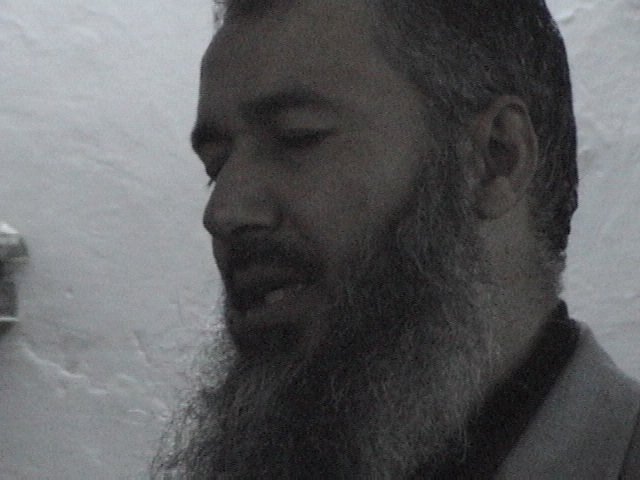January 9, 2003
We gathered early, most of the AAUJ students being able to join us today, and boarded the bus to Jenin. Part of the way, learning that the main road into Jenin was closed, we cut off into Burqin. This was the road Marthame had traveled - walked - last month when the rains had cut off the possibility of traffic. The AAUJ students regaled the Americans with tales of their many travels along this road, including climbing up and down mountains, in order to get to and from classes and exams.
Just a small part of the damage to the Jenin Refugee Camp.
Our hosts in Jenin were the YMCA which has developed an extensive program working with handicapped people in the area. We were split into three groups, each heading out with a counselor to visit with some of their clients, most of them injured during last spring's IDF actions in Jenin refugee camp.
A young Palestinian mother holds the cane she needs after being shot by Israeli helicopter fire.
Marthame's group first met with a woman who had been shot by gunfire from an Israeli helicopter - her son was injured not long after, also shot - both of them had been standing at the door of their homes. During the destruction last April, their family had evacuated to the center of the Camp, assuming that they would be safer there than on the edge where their home is. Thirty-five people were corralled in one room with the army began bulldozing their home. The soldiers eventually responded to the cries for help and left the room standing. Her right arm is paralyzed, and the YMCA has helped her renovate her kitchen and bathroom to be handicapped accessible.
The second visit was to a woman living on the edge of the camp. She has clearly had many visitors and has told her story many times: her sister, who was working in Tulkarem as a nurse, was back visiting her in Jenin. A few days into the incursion, she and her sister ventured out so she could lend a hand with the medical crisis. There was no gunfire at the time, no airplanes overhead, no curfew in effect. Stepping outside their door, they were gunned down by Israeli soldiers. For twenty minutes they cried out, but no ambulance came to help them. When they did reach the hospital, her sister died. She remains severely wounded. When one of the University folks mentioned that he knew the sister, our hostess broke down - the recitation of events gave way to raw emotion.
The third stop was her neighbor, a sixteen year old boy who stepped on an unexploded device weeks after the incursion - a friend was killed at the same time, another lost an arm. His leg was severely damaged, but not permanently.
A visit to Burqin’s historic Church of the Ten Lepers.
After a fourth visit, we rushed off - the road we arrived on was now closed by a tank, so we went back by way of Jubriat - an even more difficult journey - before arriving back in Burqin. There, we were welcomed by most of the Christian community (as well as Christians from nearby Kufr Qud) and shown the beautiful, historic church.
Back at school, Elizabeth was getting the news about tanks parked at Aqaba, a town between Tubas and Zababdeh. They allowed our school bus through, but no other traffic. One of the teachers, who is now eight months pregnant, is usually driven to school from Tubas by her husband. They were told that neither he nor his truck were allowed to pass. She and her two small boys, however, were welcome to walk across. The three of them walked to school from Aqaba to Zababdeh, about three miles.
Sheikh Fathi and Zababdeh’s Muslim community welcome our American visitors.
In the evening, the group stopped by to visit with Sheikh Fathi and some of the leaders in the Muslim community in Zababdeh. We first took a tour of the old mosque before engaging in a lively conversation upstairs at the Sheikh's home.
Palestinian women teach their new American friends traditional dances.
A group picture of our American and Palestinian youth together.
Then came the farewell celebration. It's difficult to believe how quickly the youth have bonded, and encouraging to see how close they've become after only a matter of days. Their group singing of "Lean on Me" was particularly impressive.
With the group here, Marthame has come to the realization of what has really been driving him in his work here. In 1993, he visited Ramallah on a youth exchange and had a trip that changed his life. What he wants most is for as many people as possible to have that same experience. It seems a few more have.






